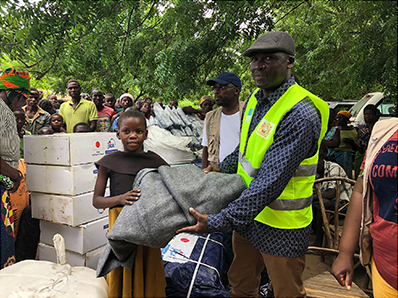(2) Humanitarian Assistance during Natural Disasters
In recent years, due in part to the impact of climate change, the frequency of short-term and localized abnormal torrential rainfall increases worldwide, and the damage caused by floods and landslides also tends to be more intense and frequent. Since developing countries have fragile economic and social infrastructures, many of them suffer great damage from disasters and require assistance from the international community.
● Japan’s Efforts
In the event of a large-scale disaster overseas, Japan stands ready for the immediate provision of emergency assistance upon the request of the government of affected countries or international organizations. Japan offers several forms of assistance, such as the deployment of disaster relief personnel, in-kind assistance, and financial assistance. Japan provides either one or a combination of these forms of assistance considering the scale of the disaster and the request from the affected country or international organization.
A. Japan Disaster Relief (JDR) Teams
There are five types of Japan Disaster Relief (JDR) teams that provide humanitarian assistance: (i) Urban Search and Rescue Team, (ii) Medical Team, (iii) Infectious Diseases Response Team, (iv) Expert Team (to provide technical advice or instructions on emergency disaster mitigation measures and recovery activities), and (v) Self-Defense Force Unit (to undertake medical activities and/or transportation of aid supplies and personnel when it is deemed particularly necessary). These teams are dispatched either individually or in combination.
B. Emergency Relief Goods
Emergency relief goods are provided as in-kind assistance. Japan stockpiles, in three overseas warehouses managed by JICA, tents, blankets, and other supplies needed and to be provided for the affected people swiftly in the wake of a disaster. In 2022, Japan provided emergency relief goods to 16 countries. Note 41
C. Emergency Grant Aid

Staff of the Department of Disaster Management Affairs in Malawi distributing emergency supplies from Japan to those affected by the cyclone that hit the country in late January 2022 (Photo: JICA)
As financial assistance, Japan provides Emergency Grant Aid to the governments of countries affected by natural disasters and/or conflict, and to international organizations that provide emergency assistance in affected areas for the purpose of providing relief to victims, refugees and displaced persons of natural disasters and conflicts overseas, and others.
In August 2022, at the request of the Government of Pakistan, Japan provided tents and plastic sheets as emergency relief goods in response to a flood disaster in the country. In addition, responding to the continuation and expansion of the subsequent damage, through multiple international organizations, Japan provided Emergency Grant Aid of a total of 7 million US dollars as humanitarian assistance in various fields including food, shelter and non-food items, health and medical care, and water and sanitation. When Tonga was hit by a volcanic eruption and tsunami in January, Japan provided assistance with a combination of dispatch of disaster relief personnel, in-kind assistance, and emergency grant aid (see Part III, Section 3 “Oceania” for details of assistance for Tonga).
D. Other Efforts
Japanese NGOs also provide various forms of assistance to disaster victims utilizing ODA. They often work as a partner with international organizations and others in emergency relief activities. Japan Platform (JPF) Note 42 provides humanitarian assistance to refugees, displaced persons, people affected by conflicts and/or natural disasters, and others. The NGOs affiliated with JPF provide various forms of support to meet the local needs in regions that are often hard for local government aid to reach such as Afghanistan (earthquake), Pakistan (flood), Ukraine (conflict), and other regions (see Cooperation with Japanese NGOs for the achievements).
Disaster response is a common concern of Japan and ASEAN countries, which are beset by numerous natural disasters. Japan supports the ASEAN Coordinating Centre for Humanitarian Assistance on disaster management (AHA Centre), which was established in 2011, and has contributed to strengthening its capacity. In 2022, Japan continued to provide support for the building and utilization of the Disaster Emergency Logistic System for ASEAN (DELSA) to rapidly transport emergency relief items to affected countries and for human resources development.
- Note 41: The 16 countries are Afghanistan, Belize, Brazil, Cuba, Democratic Republic of the Congo, Guatemala, Honduras, Kiribati, Madagascar, Malawi, Pakistan, the Philippines, South Sudan, Tonga, Tuvalu, and Zambia.
- Note 42: See the glossary.
